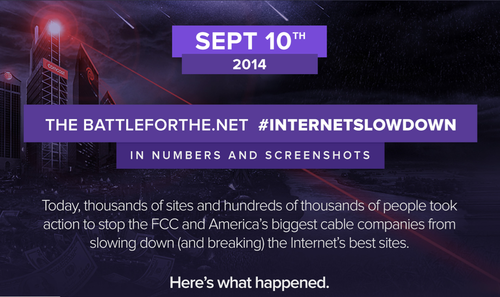Press Release: The Internet Slowdown by the numbers
Day of protest generates nearly 300,000 calls and more than 2 million emails to Congress; 722,364 people filed comments at the FCC.
WASHINGTON – On Wednesday, tech companies, websites, public interest organizations and Internet users joined forces to demonstrate overwhelming support for stronger Net Neutrality protections. Participants in the Internet Slowdown added a spinning icon representing a slow-loading Internet to their sites. Millions of people clicked through the icon to a series of actions to members of Congress, the White House and the FCC.
An infographic displaying some of the protest highlights is here: https://battleforthenet.com/#infographic
Here are screenshots from the protest: http://imgur.com/a/fqeiC
NOTE: The volume of comments overwhelmed the FCC’s servers during the slowdown. Fight for the Future is in contact with the FCC’s tech team and is working out a solution to ensure that every comment is filed properly.
Fight for the Future, Demand Progress, Engine Advocacy, and the Free Press Action Fund organized the Internet Slowdown. The Battle for the Net website featuring updates and actions is http://battleforthenet.com
Here are the numbers from the Internet Slowdown:
Calls made to Congress: 303,099
Emails sent to Congress: 2,167,092
Comments filed at the FCC: 722,364
Calls per minute to Congress (during peak hours from 11 a.m. to 3 p.m.): 1,000
Participating websites: more than 10,000
Facebook shares of spinning icon: more than 1,120,000
These numbers are valid as of 10 p.m. Eastern time on Wednesday. The final tally on Wednesday’s action will be provided at https://www.battleforthenet.com/
“The numbers tell the story: People everywhere are using the Internet to save the Internet from phone and cable companies,” said Fight for the Future Campaign Director Evan Greer. “We’ve shown that the best way to fight these powerful special interests in Washington is through mass action by people from outside Washington. The FCC and Congress can no longer dismiss the overwhelming consensus of public support for real Net Neutrality protections.”
“The Internet Slowdown was the biggest day of online activism since the Internet Blackout of 2012, when people rejected the SOPA and PIPA copyright bills,” said Demand Progress Executive Director David Segal. “As the FCC decision on Net Neutrality approaches, Internet users will continue to speak out in numbers and with a message that will be impossible to ignore.”
“Internet users spoke out loud and clear on Wednesday,“ said Free Press Action Fund President and CEO Craig Aaron. “They’re united against FCC Chairman Tom Wheeler’s plan to allow fast and slow lanes on the Internet. The chairman must now listen to the public, abandon his pay-to-play plan, and pursue the best and only path to real Net Neutrality protections – by reclassifying Internet service providers as common carriers.”

###

